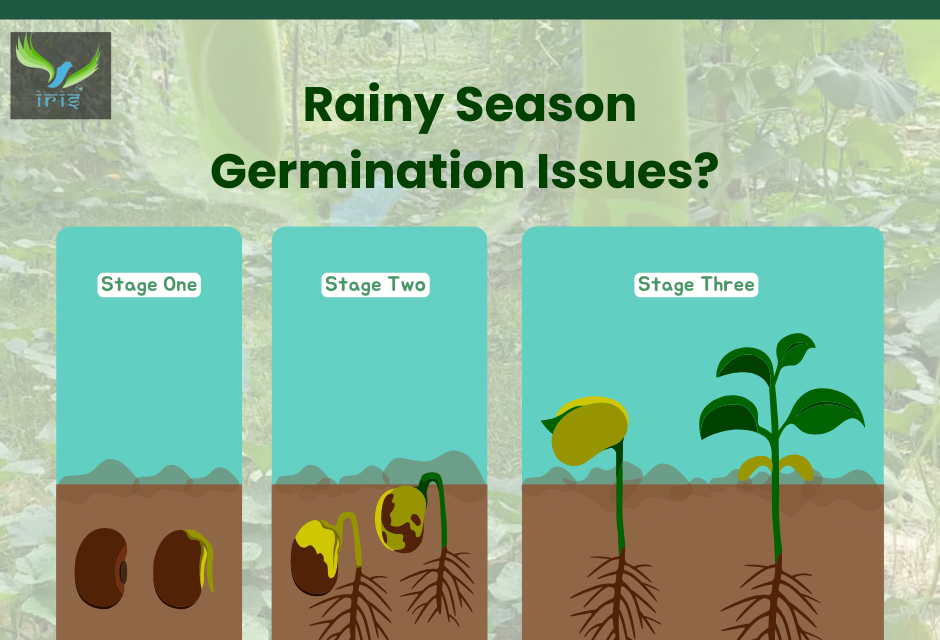Rainy Season Germination Issues? Choose a Trusted F1 Hybrid Seed Company in India
- rx bita
- 1 day ago
- 3 min read

When the rains arrive, every farmer looks forward to a strong and uniform crop stand. But too often, seeds fail to sprout or emerge weakly and unevenly. The blame often falls on the seed — but in reality, heavy rainfall introduces a chain of stress factors that damage germination.
Understanding these challenges — and responding before and after sowing — can save both time and yield.
Why Seeds Struggle During Excess Rainfall
Seeds face multiple threats in prolonged or erratic rains:
Waterlogging & Oxygen Deprivation
→ Saturated soils have no air pockets. Seeds suffocate, rot, or remain dormant.
Fungal & Bacterial Attack
→ Pythium, Fusarium, Rhizoctonia thrive in wet, cool soil — infecting seeds before sprouting.
Soil Crusting & Compaction
→ Heavy rain followed by sun causes a hard surface layer. Seedlings can’t break through.
Nutrient Leaching & Fertilizer Burn
→ Nitrogen leaches deep into the soil, while concentrated salts near the seed can burn it.
Temperature Fluctuations
→ Rain cools soil; warm-season crops stall or decay in low temperatures.
Crop Families: Different Reactions to Rain Stress
Crop Family Rain Stress Effects Solanaceous (Tomato, Chilli, Brinjal)
Waterlogging delays germination; crusting damages seedlings .Brassicaceae (Cabbage, Mustard) Tolerate cool soils but highly vulnerable to damping-off. Cucurbits (Pumpkin, Cucumber) Large seeds absorb water fast → may split under excess rain. Legumes (Pulses, Soybean) Seed coats crack from oversaturation; root rot risk increases. Cereals (Maize, Paddy) Maize rots in poor drainage; paddy requires water only after transplanting.
Note: At Iris Seeds, a trusted F1 hybrid seed company in India, we develop hybrid seeds with high vigor and improved germination, even in rainy season conditions.
Control Measures: Step-by-Step Protection
Before Sowing
Soil Prep: Use raised beds or ridges to avoid waterlogging.
Weather Watch: Avoid sowing if heavy rain is forecast.
Seed Selection: Use treated or primed seeds with proven cold-test results.
Storage: Keep seeds dry; moisture reduces viability.
At Sowing
Proper Depth: Don’t sow too deep — aim for ideal depth for quick emergence.
Seedbed Quality: A fine, firm seedbed ensures even water distribution.
Fertilizer Placement: Keep at least 5 cm away from seeds.
After Sowing
Field Monitoring (Day 2–6): Check if seeds are germinating or rotting.
Break Crusts: Use light irrigation or shallow tilling to assist emergence.
Ensure Drainage: Remove stagnant water quickly.
Gap Filling: Re-sow patches early to maintain uniform crop stand.
Role of an F1 Hybrid Seed Company in India During Rainy Season
At Iris Seeds, we recognize that germination failure is not always the farmer’s fault. That's why we offer:
Cold Germination Testing: Mimics rainy field conditions to predict real-world performance.
Advanced Seed Treatment: Broad-spectrum protection against fungal and insect attacks.
Moisture-Proof Packaging: Maintains seed viability in humid storage environments.
Farmer Alerts & Advisories: Timely sowing windows, rainfall warnings, and field tips via SMS/WhatsApp.
Fair Support & Replacement: Assistance through field diagnostics and genuine replacements for proven seed issues.
Check our F1 Hybrid Pumpkin Seeds — specially bred for uniform emergence, fast vigor, and resilience in wet soils.
A Joint Strategy: Farmers + F1 Hybrid Seed Companies in India
Rain is both a blessing and a risk.
Farmers should:
Time sowing around weather.
Improve field drainage.
Use high-quality, treated seeds.
Seed companies must:
Ensure seed vigor under stress.
Offer transparent data (including cold tests).
Provide responsive farmer support.
By sharing responsibility, both can reduce rainy-season losses and ensure a stronger crop stand — even in a challenging monsoon.
FAQs – Germination & Rainy Season Farming
Q1: Can F1 hybrid seeds germinate well during the rainy season?
Yes — especially when sourced from a reputed F1 hybrid seed company in India like Iris Seeds. Our hybrids are developed for strong vigor and resistance to early-season stress.
Q2: What is cold germination testing, and why is it important?
Cold germination testing simulates rainy, cool field conditions. It provides a realistic measure of seed performance — more accurate than ideal lab tests.
Q3: What should I do if seeds fail to germinate after heavy rain?
Dig and inspect seeds. If they’re rotting or haven't sprouted, re-sow immediately after improving drainage or breaking soil crusts. Use treated hybrid seeds to improve second-round emergence.
Q4: Can pumpkin seeds split or rot during rainy conditions?
Yes. Large seeds like pumpkin absorb water quickly, making them prone to splitting or decay. Choosing F1 hybrid pumpkin seeds from companies like Iris Seeds helps avoid this issue.
Q5: How should I store F1 hybrid seeds during the monsoon?
Store in a cool, dry area using moisture-proof packaging. Place bags on wooden pallets to avoid ground moisture, and reseal bags after use.








Comments